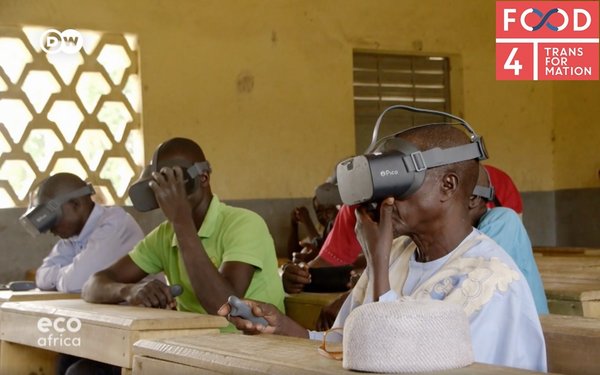 Read this article in French
Read this article in French- Share this article
- Subscribe to our newsletter
Cotton of the future – using VR glasses as a training tool
At the touch of a button, several square kilometres of cotton fields unfold before the farmers' eyes. Soil, plants, pests, and beneficial insects move around in a virtual world that is hardly any different from the real world.
The training is being piloted by Deutsche Gesellschaft für Internationale Zusammenarbeit (GIZ) together with the International Cotton Advisory Committee (ICAC). The training is not only about increasing the yield of the cotton harvest, but also about protecting the environment and people's health.
Saskia Widenhorn was heavily involved in project development and implementation on behalf of GIZ and was also partly on site in Cameroon. “It is much more like experiencing what you have learned than with traditional training, which makes the learning content even more accessible,” she says, emphasising the benefits of VR-based training.
The videos are particularly valuable in rural regions. Educational opportunities – and therefore also the opportunities to acquire reading and writing skills – are often limited in these regions. With the help of technology, particularly disadvantaged groups, such as women, also gain access to education.
Education based on “training the trainers” principle
The project follows a "training the trainers" approach, in which multipliers are first trained in the use of VR training in order to then pass on their knowledge to the farmers.
Compared to traditional training methods, VR training videos are more intensive and have a more lasting learning effect. Although the purchase and provision of the technical equipment is a costly undertaking, it is one that is worthwhile. Compared to conventional training courses, where travel costs can account for a large proportion of the total costs, there is a major advantage for the training participants: they can complete the training anywhere and are not dependent on the presence of trainers.
The video footage for the training material was recorded by ICAC in cotton fields in India at different times of the year to show the plants at different stages of growth and thus ensure a holistic learning experience.
The training has now been translated into several languages, including local languages, and rolled out in other countries. So far, 285 farmers in a total of five countries – Zambia, India, Côte d'Ivoire, Kenya and Egypt – have been trained and can now pass on their knowledge. More than 20,000 cotton farmers have been encouraged to make their farming methods more sustainable.
A video report on the project has been published by Deutsche Welle (DW).
Authors: Hannah Bickel, Nastaran Zarnegari and Sarah Tosse, Deutsche Gesellschaft für Internationale Zusammenarbeit (GIZ) GmbH, Bonn/Eschborn, Germany.
This article was taken from the Food4Transformation website.





Add a comment
Be the First to Comment